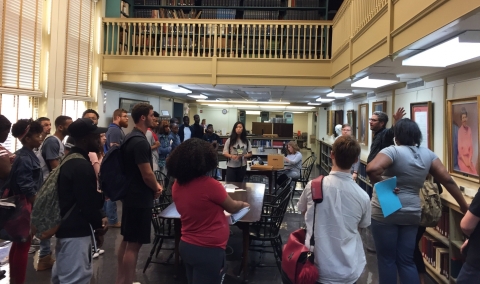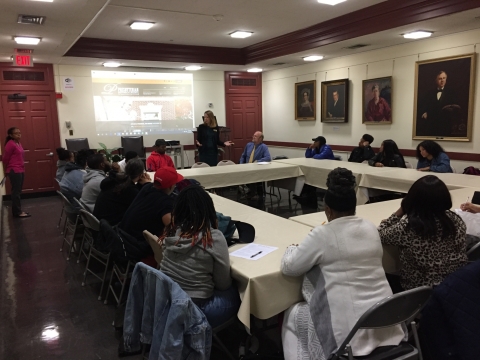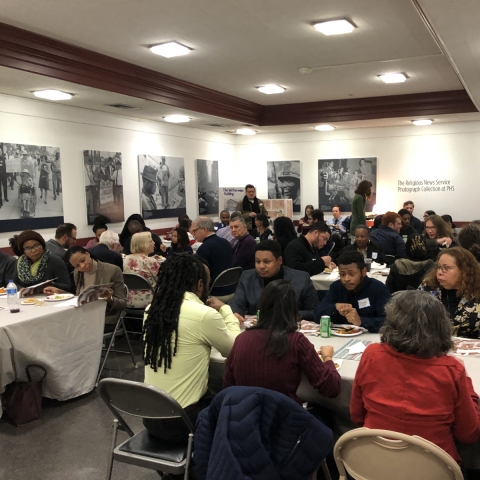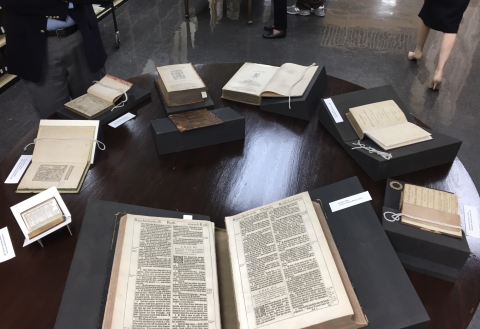CCP students in American history, architecture, English classes, and in the Honors Program have visited PHS to do hands-on work with historic texts and documents in our collections.
In consultation with CCP professors, archivists at PHS curated sets of primary sources focusing on discrete topics that mapped to each course's curriculum. Classes made group visits to PHS to meet the staff, tour the building, and learn about how to conduct research in the archives. Essential orientation information was also provided on handouts [link a sample] and on the PHS website [link to CCP info page].
Classes held online, both before and during the pandemic, have had access to digitized versions of primary sources, and PHS staff have conducted online orientation sessions.
This page presents a summary of the CCP classes we've worked with.

In Joel Tannenbaum's 19th Century US History course, students visited PHS to conduct research. The first time the class came to PHS was in the fall of 2017 -- our very first visitors from CCP. Students selected one of twelve topics in 19th century American History. They worked with primary sources at PHS, discovered secondary sources at PHS and in the CCP library, and wrote a short research essay. In fall 2018 and spring 2019, Professor Tannenbaum's 19th Century History course was held online. Students used digitized primary sources and secondary sources suggested to them by PHS and their professor. In the spring 2019 course, students were given scaffolding tools to help them master the language and ideas in the primary sources, and they had access to writing assistance by BKBB's writing tutor, Jamail Khan.
Jacqueline Akins brought students in her African American History to 1877 course to PHS in spring 2018. Students chose from among seven historical topics. They made individual appointments to visit PHS where they examined curated sets of primary and secondary sources. They wrote short research papers based on their discoveries.
Aaron Love taught this African American History course in spring 2019. Students worked in groups to develop presentations based on primary sources at PHS and secondary sources provided by Professor Love. Students were supported in their development of themes and writing of their presentations by BKBB's writing tutor, Jamail Khan.

David Prejsnar first brought his Religion in American History class to PHS in summer 2018. This class was part of CCP's ACE Program, and the students made a one-time visit to PHS, where they met the staff, toured the building, and engaged in a "speed dating" activity to learn about some of the museum and archival holdings of PHS.
Professor Prejsnar brought the class to PHS again in fall 2018. Students chose from among seven topics, and made individual research visits to the reading room to see primary and secondary sources curated for their topic.
In fall 2019, the class visited again. This time, students had six topics to choose from. In addition to the primary and secondary sources, they were given scaffolding tools to help them understand the sources, and they had the support of the project's writing tutor, Jamail Khan.
In fall 2020, Religion in American History was held online. PHS staff joined the class for a virtual "class visit to the archives." Students chose from among six historical topics, and used digitized primary and secondary sources to complete short assignments.
Miles Grosbard's Philadelphia History: Architecture and Planning course took walking tours of parts of the city, and he built a research visit to PHS into the course. In addition to seeing the exterior of our building and the Alexander Calder statues in our courtyard, students came in to see the building's interior, meet the staff, get an orientation to doing archival research.
In the spring 2019 course, students used PHS databases and catalogs to find records about a Presbyterian Church in Philadelphia. They learned about the history of the church, discovered images and architectural drawings, and in many cases, visited the buildings in person. They created poster presentations to share their discoveries.
In summer 2019, students again studied churches in Philadelphia, this time starting with materials curated for them by PHS archivists, and then requesting additional materials from the archives to do further research.
In fall 2019, students studied four Philadelphia buildings: the Witherspoon Building, the Arch Street Presbyterian Church, the Presbyterian Ministers Life Insurance Building, and our own Presbyterian Historical Society. The students worked in groups, and at the end of the semester, created posters and gave presentations about their chosen buildings.
In spring 2020, students each chose a Philadelphia Presbyterian Church to research in the archives. This project was truncated when PHS closed because of Covid-19.
In the spring 2019 semester we worked with our first English class. We sent facsimiles of selected documents and images about four Presbyterian foreign missionaries to students in Simone Zelitch's Creative Writing class. Students used the images and text to inspire poems and short fiction pieces.

Simone Zelitch brought her Fiction Writing class to PHS in fall 2019. During the class visit students looked at items from several missionaries' personal papers, and images from photographic collections. PHS archivists sent the class facsimiles of about 120 photographs, letters, and other documents. Students chose documents from a grab-bag, and then wrote short fiction assignments focusing on character, setting, plot, point of view, and dialogue. At the end of the semester, the students' work was published as "A Picture's Worth: A Snapshot Anthology."
Cindy Giddle brought her students in English 102, The Research Paper, to PHS in spring 2020. PHS archivists worked with the professor to select books, pamphlets, and newspapers documenting the issues of poverty, education, immigration, temperance, and incarceration in 19th century Philadelphia. Students were assigned to write a research paper focusing on one of these topics, and they made an initial visit to PHS as a group to examine their primary sources. Covid-19 forced a change in plan, and instead of returning for individual research visits to the PHS reading room, students had access to digital versions of the primary sources.
In Kate Sanchez's Poetry Writing course, students worked with PHS materials as inspiration. The students were first asked to choose one of eight photographs, and then they wrote an ekphrastic poem based on that photo [ekphrasis: a dramatic description of an image or work of art]. Next, they looked at additional primary sources related to their photograph. These materials included letters, diary pages, pamphlets, additional photos, and photo album pages. They then wrote another poem that encompassed the new information they'd learned about their subject. Finally, they were given citations and short notes about the subjects of their photographs.
Students in Osvil Acosta-Morales's Social and Political Philosophy class made a one day visit to PHS to examine volumes from our rare book collection. Students worked with European and American volumes illustrating concepts of justice, freedom, property, and civic responsibility.

PHS was the destination for one of the Honors Program: Wildcard Wednesday visits in spring 2019. Brian Seymour brought the students to our meeting room, where they examined a selection of Reformation Bibles from our rare book and Bible collections. Students saw a 1516 Erasmus Bible; a 1540 Great Bible, a 1599 Luther Bible, a 1569 Geneva Bible, and a 1657 London Polyglot Bible. As they looked through the versions, they talked about the connections between the texts and their connection to the history of Protestantism.
